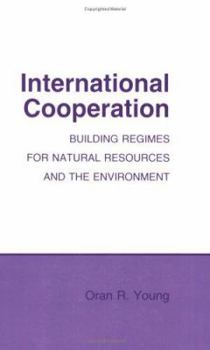International Cooperation: Building Regimes for Natural Resources and the Environment
(Part of the Cornell Studies in Political Economy Series)
Select Format
Select Condition 
Book Overview
The notion of regimes as institutions that shape international behavior has received much attention from scholars in the field of international relations as a way of understanding how sovereign states... This description may be from another edition of this product.
Format:Paperback
Language:English
ISBN:0801495210
ISBN13:9780801495212
Release Date:January 1989
Publisher:Cornell University Press
Length:248 Pages
Weight:0.85 lbs.
Customer Reviews
1 rating
A Classical Work on International Regimes and Institutions
Published by Thriftbooks.com User , 22 years ago
Oran Young defines international institutions as special arrangements in response to collective action problems in international cooperation. In regard to regimes, on the other hand, he accepts at first international regimes as social institutions since they are products of human activity. This formulation eventually facilitates the possibility of regime change as independent from power and distribution of capabilities. In his criticism of the realist concepts of institutions, Young follows the argument; hegemon's role in international regimes is an exception not a rule or a general pattern. In this respect, he mentions three types of regime formation unlike to hegemonic stability theory, which accounts only hegemon or coercive power in this process. Regimes can be spontaneous, negotiated or imposed institutions while these three categories of institutions are not mutually exclusive. First two types of regime formation do not necessitate any hegemon. Coercive power or hegemon may be significant for just imposed regimes. Young also argues that hegemon may be important only for the transformation of imposed regimes not for spontaneous or negotiated regimes.In this formulation of international regimes, as mentioned before, power is not sufficient condition for regime change. Both exogenous (international system, distribution of capabilities, power, prevailing technology etc.) and endogenous (domestic politics, inner dynamics or internal contradictions of regimes etc.) factors can lead to regime transformation. It is also distinctive in Young's examination of regimes in contrast to the realist formulation of regimes that he evaluates these institutions are crucial at both domestic and international level. They are not epiphenomena (of power) since they are important as independent variables for international cooperation. In addition to these theoretical arguments International Cooperation has also three case studies. They are in the issue areas of marine fisheries and deep seabed mining, nuclear accidents, and arctic shipping. In all three case studies Young emphasizes the importance of regimes as social institutions for preservation and governance of natural resources and environment. He also considers that regional regime arrangements would be more effective and less costly than international regimes. Overall, Oran Young's work can be considered as a classical work on international regimes. Henceforth, it can be deemed as a must reading in this field.





